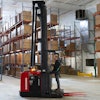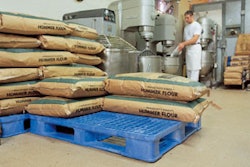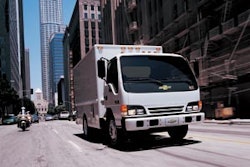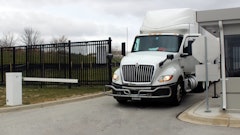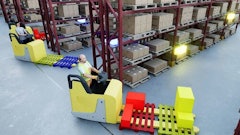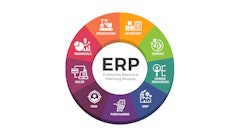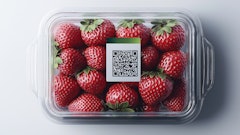Bloomberg: Wooden pallets churned out in their billions over the five decades during which they've dominated world trade face a challenge from a cardboard rival that's the brainchild of furniture retailer Ikea Group.
Ikea, which uses 10 million pallets to supply its stores with bookcases, pillows and candles, will ditch wood by January in favor of a lighter, thinner, paper-based alternative the Swedish company says will shave 10 percent from transport costs.
"We don't know if the paper pallet will be the ultimate solution, but it's better than wood," says Jeanette Skjelmose, sustainability manager at Ikea's supply-chain unit. Though made from folded corrugated-card, the design can support a load of 750 kilograms (1,650 pounds), the same as timber, she says.
Assembled from locally sourced card by Ikea's 1,200 global suppliers, the pallets will be good for a single delivery before being pulped by the retailer. One-third the height of wooden trays at 5 centimeters (2 inches) and 90 percent lighter at 2.5 kilos, they'll save thousands of truck trips and cut transport bills by 140 million euros ($193 million) a year at a cost of 90 million euros for paper purchases and new forklifts, Ikea says.
Container Revolution
"We hope this will be a start in making transportation systems smarter and freight as compact as possible," Skjelmose says in an interview in Helsingborg, where Ikea has its Swedish base. The world's No. 1 home-furniture company will help ease the transition from wood by shipping ready-to-assemble pallets to some of its suppliers, about 330 of which are based in China.
Ikea's model, together with designs from manufacturers including IPP Logipal, part of Faber Halbertsma Group, Europe's biggest pallet producer, challenges a wood-based stacking system that's dominated world trade since World War II.
Timber pallets originated a century ago as simple "skids" that evolved into a design compatible with the forklift invented in the 1920s. Key to new handling systems added in the 1940s, they came into their own with containerization from the 1950s. As many as 500 million are made each year, with up to 2 billion circulating in North America alone, says Jeff McBee, pallet analyst at Industrial Reporting Inc. in Ashland, Virginia.
Paper pallets designed to last for a single journey also represent a challenge to pooling systems used by many of the container industry's biggest customers, including Cincinnati- based Procter & Gamble Co. and Rotterdam-based Unilever, the world's two largest consumer-goods companies.
"Not Durable"
Pooled pallets like those provided by industry leader CHEP, a unit of Sydney-based Brambles Ltd. deriving its name from Australia's Commonwealth Handling Equipment Pool, which oversaw defense supplies in WWII, have gained in popularity as companies find it easier and more cost-effective to outsource flows.
Brambles, which counts Procter and Unilever as customers, services 54 countries with 400 million pallets, distinguishable by their blue edging from the red-edged pool run by leading rival PECO Pallet Inc. of Yonkers, New York, which was bought by Pritzker Group in February for an undisclosed sum.
CHEP doesn't use paper-based pallets and has no plans to change, Brambles spokesman James Hall said by telephone.
"Paper pallets and other cardboard packaging products are not suitable for pooling," Hall says. "They're not durable enough, not capable of withstanding heavy loads or extremes of weather and temperature, and they can't be repaired. It's not what our customers are looking for."
Same Limitations
Pallet pooling is especially useful for companies that need to turn around products quickly, such as food suppliers, while a wooden structure is preferable for industries dealing in heavier goods, MacQuarie Group Ltd. analyst Russell Shaw says.
"Wood helps to prevent product damage," says Sydney-based Shaw, who has an "outperform" rating in Brambles. "If you're transporting something really light such as cushions or candles, like Ikea, you probably don't need a high-quality pallet."
Skjelmose says the furniture company's pallets have the same limitations as the wooden alternative if stacked properly.
"It doesn't get much heavier than that," she says, while indicating a four-foot tall stack of hundreds of porcelain plates resting on a paper pallet in Ikea's Helsingborg branch.
Air France Switch
IPP Logipal has begun producing paper pallets at a plant in Goch, Germany, and may enter France, Belgium and the Netherlands next year, according to Ruud Schrama, its marketing manager.
"We want to triple or quadruple our paper pallet business within five years," Schrama says in an interview, declining to give specific figures. "Our growth ambition is enormous."
Other new materials are also in favor, with Air France-KLM Group, Europe's biggest airline, planning to throw out 7,000 aluminum pallets used in its 120 freighters by mid-2012 in favor of composite "Herculight" pallets developed by Driessen Group, a unit of Zodiac Aerospace SA, that are 35 percent lighter.
"We'll use less fuel and it'll be possible for us to carry more freight," Gijsbet Woelders, vice president of worldwide operations for KLM Cargo, says in an interview. "We'll save a lot of money, millions of euros. It's important."
While alternative materials that also include plastic and steel will have some success, they currently represent no real threat to wood, Industrial Reporting's McBee says, enjoying only a "single digit" revenue share that could double and still remain a minor part of the market.
Paper will most likely go the same way as an experiment 10 years ago, when CHEP made thousands of plastic pallets for its pool before dropping the plan, he said, not least because they proved more prone to "disappear" than wooden ones, being harder-wearing and therefore more useful for the multitude of secondary purposes that the structures are often put to.
The deciding factor in Ikea's foray into paper will be whether the savings on transportation costs from the lighter loads, higher volumes and one-way travel outweigh those from deploying wooden pallets on multiple trips, McBee says.
"This obviously looks good to Ikea on paper, but I'd like to see what they have to say a year from now," he says. "I'm not necessarily skeptical, but it may be closer to a wash than they suspect."
--With assistance from Robert Fenner in Sydney. Editors: Chris Jasper, Chad Thomas.
To contact the reporter on this story: Ola Kinnander in Stockholm, at [email protected]
To contact the editor responsible for this story: Chad Thomas at [email protected]


